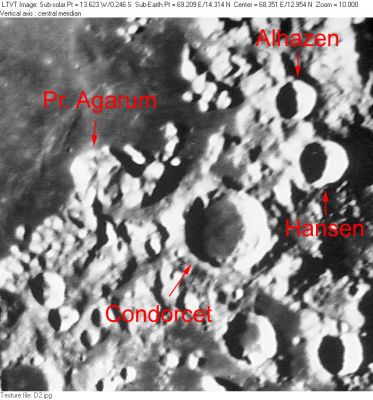Condorcet
Contents
Condorcet
|
Lat: 12.1°N, Long: 69.6°E, Diam: 74 km, Depth: 2.65 km, Rükl: 38 |
Consolidated Lunar Atlas plate D2 The labeled features in this rectified version of the Consolidated Lunar Atlas plate are Condorcet, Promontorium Agarum, Alhazen and Hansen. Also visible, but not labeled, are Dorsa Harker (to the west of Pr. Agarum); Mons Usov; Auzout, van Albada and Krogh; the northeast part of Firmicus (in the lower left corner), and the northern part of Mare Undarum (along most of the lower margin).
Images
LPOD Photo Gallery Lunar Orbiter Images Apollo Images
Maps
(LAC zone 62B2) LAC map Geologic map LM map LTO map
Description
Description: Elger
(IAU Directions) CONDORCET.--A very prominent ring-plain, 45 miles in diameter, situated on the mountainous S.E. margin of the Mare Crisium. It is encircled by a lofty wall about 8,000 feet in height. The dark interior of this and of the three preceding formations render them easily traceable under a high angle of illumination.
Description: Wikipedia
Additional Information
- Depth data from Kurt Fisher database
Westfall, 2000: 2.65 km
Cherrington, 1969: 3.07 km - Satellite crater Condorcet T is on the ALPO list of bright ray craters.
- Condorcet T and adjacent Condorcet TA were captured on Apollo 16's panoramic ITEK-camera frame AS16-P-9182 (scroll rightward until you see a couple of bright craters with dark streaks on their inner slopes)(the one with the "central peak" on its floor is Condorcet T, the other one with the long dark streak is Condorcet TA).- DannyCaes May 7, 2011
- Condorcet T is also a thermal anomaly crater, implying a youthful age - Moore et al, 1980
Nomenclature
Marie Jean Antoine Nicolas Caritat, Marquis de Condorcet (September 17, 1743 – March 28, 1794) was a French philosopher, mathematician, and early political scientist.
Nic Parthenius?
The crater now known as Condorcet could have been Melchior a Briga's Nic Parthenius (see the location of the capital omega (Nic Parthenius) on Melchior a Briga's map of 1747; pages 90-91 in E.A.Whitaker's Mapping and Naming the Moon). - DannyCaes Feb 20, 2016
North Valley
- Southeast of Mare Crisium (near Condorcet, Auzout, Firmicus, and Apollonius) runs the unofficially named North Valley/ Vallis North; or Vermiform Valley. These unofficial names are included in the Hitchhiker's Guide to Rukl 38.
LPOD Articles
Bibliography
